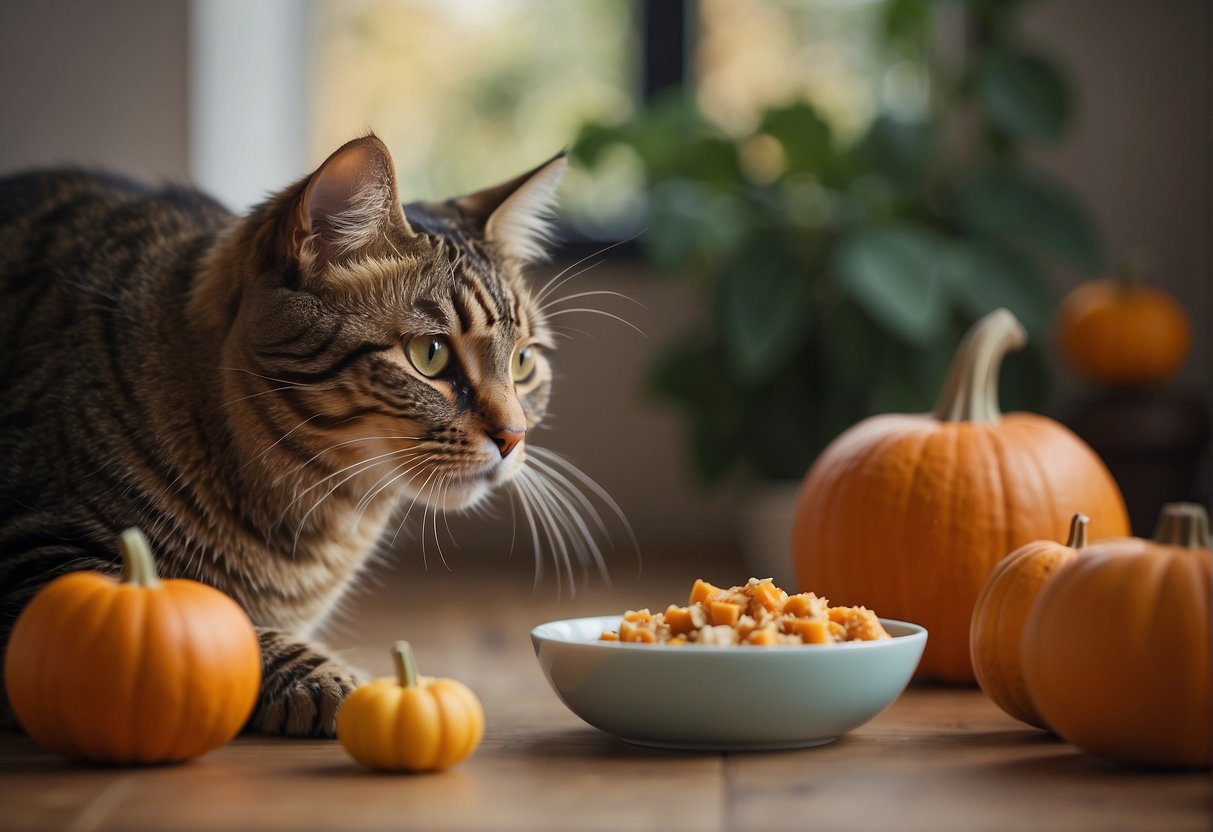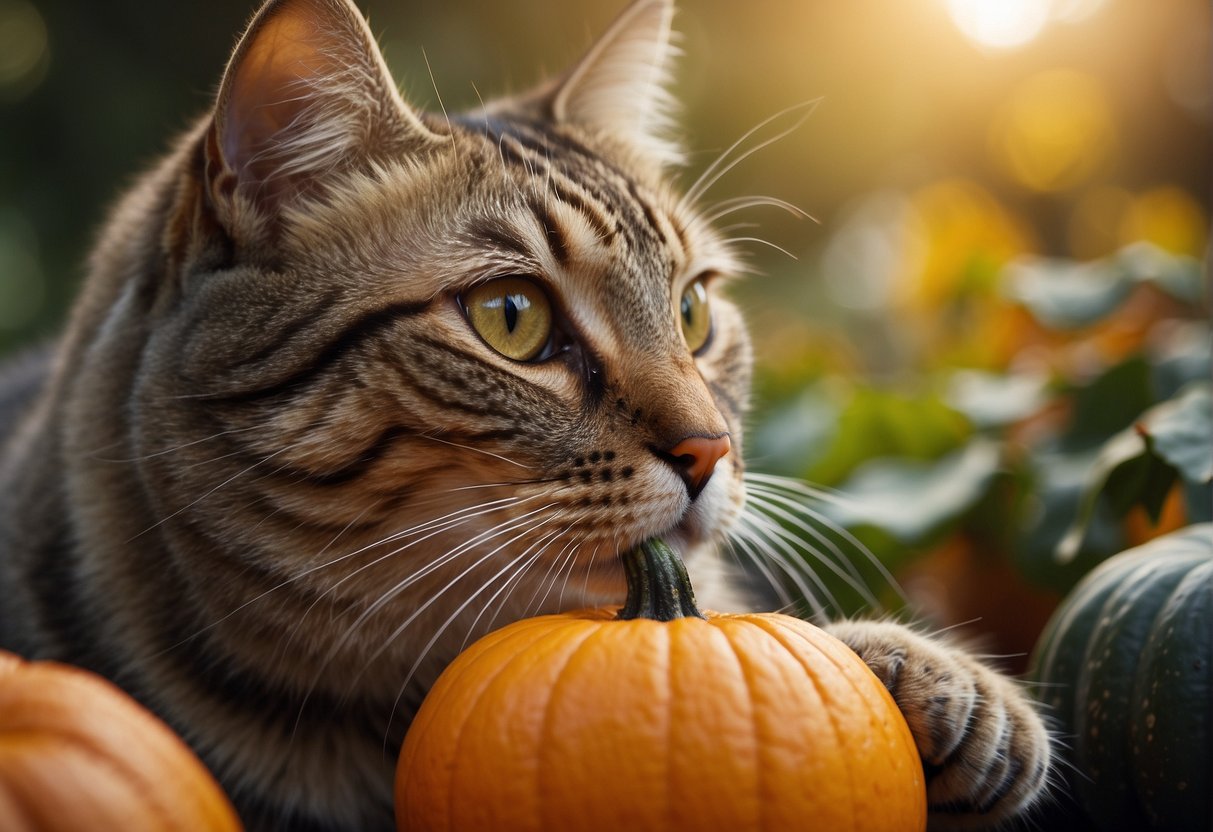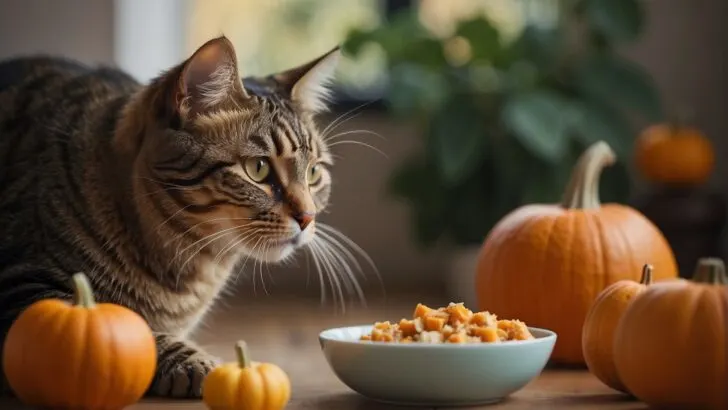Yes, cats can have pumpkin, and it’s actually a common ingredient in some cat foods due to its health benefits. Your feline friend may enjoy a bit of pure pumpkin puree as a treat.
The fiber in pumpkin can aid in digestion and help with issues like hairballs and mild constipation.
In my own experience with cats, a little pumpkin mixed into their regular food can make a noticeable difference in their digestive regularity.

When introducing pumpkin to your cat’s diet, it’s essential to do so gradually to ensure they don’t have any adverse reactions.
Besides its digestive benefits, pumpkin is also a source of important nutrients such as vitamins A, C, and E, along with zinc and potassium which contribute to your cat’s overall health.
However, it’s important to use only plain, canned pumpkin or cooked fresh pumpkin without any added sugars or spices.
The canned pumpkin pie mix often contains additives that are not safe for cats.
So next time you’re at the store, you might want to grab a can of plain pumpkin to keep on hand – just a spoonful stirred into your cat’s meal could help keep things running smoothly for them.
Pumpkin and Cat Health
When considering adding pumpkin to your cat’s diet, it’s important to recognize the nutritional benefits it offers and how it can be incorporated safely.
Pumpkin can be a useful addition for managing your cat’s digestive health, but certain precautions should be taken to ensure it’s safe for your feline friend.
Nutritional Benefits of Pumpkin
Pumpkin is a low-calorie food rich in important nutrients like fiber, water, vitamins, and minerals such as calcium, potassium, and phosphorus that can contribute to your cat’s overall health.
It’s particularly noted for its high soluble fiber content, which aids in digestion.
Pumpkin in Cats’ Diet
Your cat, being an obligate carnivore, requires a diet primarily composed of meat. However, the inclusion of plain, pureed pumpkin can provide a supplementary source of nutrients.
Some commercial cat foods even contain pumpkin for its beneficial properties.
Remember, always opt for plain pumpkin or pumpkin puree without any added sugars or spices.

Managing Digestive Health
Fiber present in pumpkin can help with various digestive issues in cats, such as diarrhea, constipation, and hairballs.
The soluble fiber in pumpkin absorbs water, which can help with loose stool, while also easing the passage of hair through the digestive system.
A small amount of pumpkin can also assist if your cat is constipated.
Concerns and Precautions
While pumpkin is safe for cats in moderation, too much can cause health problems.
Always start with a small amount and avoid pumpkin pie filling—it contains spices like cinnamon, nutmeg, ginger, allspice, and sugar, which can be toxic to cats.
Similarly, pumpkin seeds can be a choking hazard and should be removed.
Feeding Guidelines
Understanding how to properly integrate pumpkin into your cat’s diet is crucial. Not only does it offer extra fiber, but it must be administered in appropriate forms and quantities for optimal benefits.
Appropriate Pumpkin Forms
When it comes to pumpkin, the safest way to offer it to your cat is by providing plain, cooked pumpkin or pumpkin puree—without any added sugars or spices.
These forms are easy for your cat to digest and are far safer than raw pumpkin or pumpkin pie fillings, which can contain harmful ingredients for your feline friend.
Absolutely avoid pumpkin pie, as the added spices, sugar, and preservatives can lead to health complications.
Recommended Portions
Portion control is key:
- Kittens: A half teaspoon of pumpkin puree daily.
- Adult Cats: One to two teaspoons can be offered daily.
- Senior Cats: One teaspoon is generally suitable.
See this routine as a dietary supplement rather than a core part of their diet.
Excessive amounts can cause digestive upset, so it’s best to start small and adjust as needed. Keep it in moderation as part of a balanced diet.
Weight Management and Health
When considering your cat’s diet, incorporating pumpkin can be beneficial, especially in the area of weight management and health.
The low-calorie content of pumpkin paired with its high fiber makes it a supportive supplement for weight control.
Pumpkin for Weight Loss
If your cat is tipping the scales, you’re likely looking for healthy ways to help them lose weight.
Pumpkin is low in calories yet rich in fiber, which can help your furry friend feel fuller longer without adding excess calories.
This can prevent overeating and help in managing your cat’s weight effectively.
- High Fiber Content: Helps increase satiety (feeling of fullness).
- Low Calorie: Assists in creating a calorie deficit, essential for weight loss.
- Supplementing Meals: Mix a tablespoon of plain, canned pumpkin into your cat’s regular food to enhance their diet.
Additional Health Considerations
Beyond weight management, pumpkin has several other health benefits for your cat.
The nutrients in pumpkin, such as Vitamin A and zinc, can improve your cat’s skin and coat health.
Also, the fiber in pumpkin can aid healthy digestion and may help with stools, especially if your cat is prone to constipation; it helps in normalizing bowel movements by adding bulk and absorbing excess water.
- Skin and Coat Health: Nutrients contribute to a shiny coat and healthy skin.
- Digestive Aid: Soluble and insoluble fiber support digestive health.
- Constipation Relief: Provides a gentle solution to ease constipated cats.
Substituting Pumpkin in the Diet
If for some reason pumpkin isn’t suitable for your furball or you’re simply looking for variety, there are other fibrous food alternatives to consider for a healthy cat diet.
- Commercial cat foods: Many commercial cat foods are balanced to provide a complete diet. Look for brands with high fiber content to mimic the benefits of pumpkin.
- Green Beans: A low-calorie vegetable that’s also rich in fiber.

My name is James, and welcome to FAQCats!
Along with our team of cat owners, expert pet enthusiasts, and pet professionals, we aim to write engaging helpful, engaging content about cats. At FAQCats we strive to provide content that’s accurate and fun to read. Our team writes about everything related to cats; even the most complex of topics. Through extensive research and caring for our own fur-pals, we’re able to provide something cat owners worldwide will love. Have a look around, and leave us feedback anytime!

